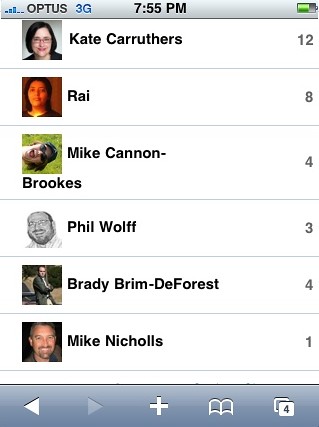Social media, is being killed not by fail whales , but social awkwardness. Facebook as a simple example – is everyone you add there really your "friend"? What’s a "friend", what ‘group’ do I put them in…it’s all very stressful. However bring into the mix social media services (sites where people collaborate, share content, discuss openly) and this stress becomes a real pain in the arse.
Twitter for example – you get alerts when people post a message. What happens when there is someone you know in real life, you are friendly with, but their Twitter stream is verbal diarrhoea? You force yourself to subscribe to them, because the social awkwardness matters more to you. Or Friendfeed, where people share links – it’s even worse. I would even go on to say it makes the service unusable.
Enter Google Reader, the tool I use to consume my online information habit. There is a feature that determines who e-mails you, and if they use Google Reader and share links, will come up along with your other subscriptions. It’s become such a valuable thing for me, that I now focus my attention on clearing items there ahead of my other few dozen subscriptions. The reason being, it’s the benefit of social media services without the social awkwardness.
Take Chris Saad, who was on my list. I didn’t like the things he shared – movie reviews – so I hid him. Up until now when a Google blog search will notify him (I expect him to find this and respond within 6 hours of posting this – watch!), he probably didn’t even know. However, if I was to unsubscribe from him on something like Twitter – he’d work it out – and say "dude, what’s the deal?". Because an inherent value of social media is that it’s collaborative communication; it’s just that too much communication from too many people can become more noise than signal.
This new age of mass collaboration is a massive thing, that I don’t think even the early adopters driving it, realise what’s happening. It’s the future of media – the fact people I know and trust will suggest articles, is the same human-powered recommendations the mass media have been doing -but so much more efficient, relevant and better.
And yet, Google Reader in its simplicity does it best – it’s almost like a secret. Mike Cannon-Brookes probably doesn’t even realise I track his shared links, but I love them because he reads a lot of RSS feeds on diverse subjects that interest me. Likewise, Kate Carruthers has such a diverse reading list I feel like I can whittle down my RSS subscriptions which stress me from having too much, and just get fed from her the good stuff.
Am I showing up in their field? Who knows. And quite frankly, who cares. I know I do for Brady Brim De-Forest, because he’s re-shared stuff I shared that I doubt he subscribes to (at least then). But that doubt detracts the fact it doesn’t matter. It’s a secret club – I go about clicking the "share" button for good content I come across, thinking perhaps someone follows them and would appreciate it. There’s no feedback mechanism, other than seeing other people encouraged to do the same. And this is the first time I’ve ever discussed the club openly. I think it exists. Maybe it doesn’t. But damn, it rocks.

